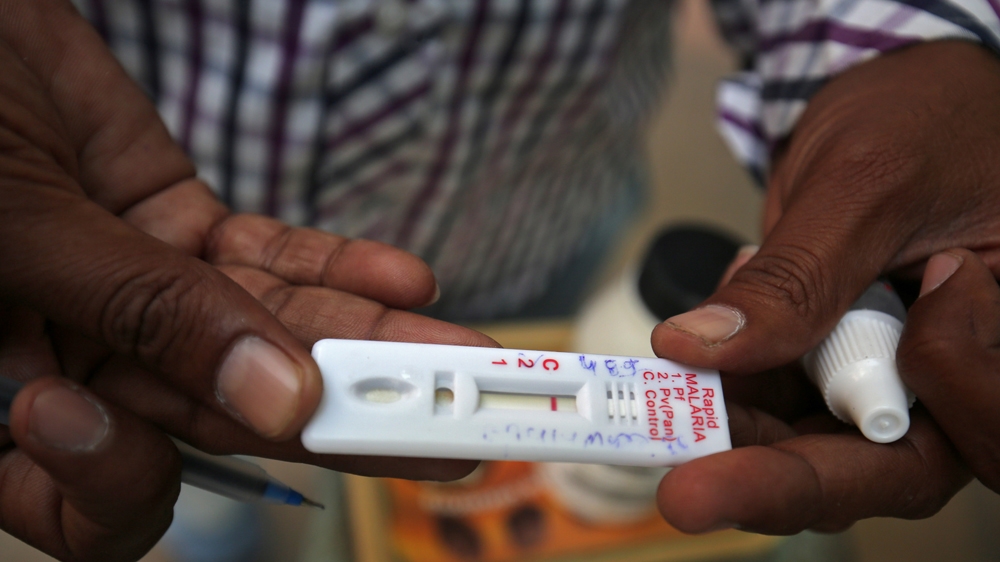1,800 dead as malaria 'epidemic' rages in Burundi: UN

Malaria has killed more than 1,800 people in Burundi this year, the United Nations humanitarian agency has said, a death toll rivalling an Ebola outbreak in the neighbouring Democratic Republic of Congo.
In its latest situation report, the United Nations Office for the Coordination of Humanitarian Affairs (OCHA) said 5.7 million cases of malaria had been recorded in Burundi in 2019 - a figure roughly equal to half its entire population.
Of those cases, a total of 1,801 died from the mosquito-born disease in Burundi between January 1 and July 21, OCHA said.
The tiny country of 11 million people in the African Great Lakes region has still not declared a national emergency, despite OCHA saying the outbreak crossed "epidemic proportions" in May.
"The national malaria outbreak response plan, which is currently being validated, has highlighted a lack of human, logistical and financial resources for effective response," OCHA said in its latest weekly bulletin on humanitarian emergencies.
"All stakeholders, including the national authorities and partners are called upon to provide the requisite resources to mount a robust response to this event before it escalates."
A lack of preventive measures such as mosquito nets, climatic changes and increased movements of people from mountain areas with low immunity to malaria were driving the crisis, OCHA said.
'Many crises'
An OCHA official told AFP news agency that "the decision to declare an epidemic is the sovereignty of the Burundian state".
The country declared a malaria epidemic in March 2017, when it had recorded 1.8 million cases and 700 deaths, but was resisting doing the same now.
A senior government official, who declined to be named, said the government did not want to admit weakness with elections set for 2020.
"We are less than a year away from the presidential election. [President Pierre] Nkurunziza, who is facing many crises, does not want to recognise what could be considered a failure of his health policy," the official told AFP.
In 2015, Nkurunziza ran for a third term and was reelected in elections boycotted by most of the opposition.
At least 1,200 people were killed and more than 400,000 displaced in violence the UN says was mostly carried out by state security forces.
Nkurunziza announced in 2018 that he would not stand again, confounding critics who accused him of working to extend his grip on power.
UN investigators said in July that "drastic" steps were needed to boost democratic freedoms in Burundi if the government wanted the elections to be considered credible.
Burundi, one of the poorest countries in the region, borders the DRC, where the second-worst Ebola outbreak in history has killed more than 1,800 people amid fears the infectious fever could spread beyond its borders.
But malaria is a much bigger killer in the continent.
The World Health Organization recorded nearly 220 million cases of the parasitic illness in 2017, with an estimated 435,000 deaths worldwide.
More than 90 percent of malaria cases and deaths were in Africa.
Related Articles:
Jut as we warned a month ago, the World Health Organization said today - following a meeting of experts - that the deadly Ebola outbreak in Congo has become an international public health emergency. More than 1,600 people have died since August in the second deadliest Ebola outbreak in history, which is unfolding in a region described as a war zone.
If we want to stop malaria from killing more than 400,000 people every year, we’ll need to stop mosquitoes — the irksome insects are the primary transmitter of the deadly disease. To that end, researchers from the University of Maryland (UMD) genetically modified a fungus to produce a spider toxin that quickly kills mosquitoes. And in an out-of-lab trial, the fungus reduced a mosquito population by more than 99 percent, according to NPR — though the team’s controversial use of genetic engineering has some worried the method is too dangerous for the real world.
Bed nets. Insecticides. Sterile and genetically modified insects. Now scientists are adding a genetically engineered toxic fungus to the arsenal of weapons to wipe out mosquitoes that carry the malaria parasite. Although insecticides and insecticide-laced bed nets, by far the two most commonly employed strategies, have effectively lowered the numbers of infections and deaths, the global malaria burden has failed to decline in the last few years. In 2017, 219 million people were infected with malaria and an estimated 435,000 died. That is because mosquitoes are evolving resistance to insecticides.
The world's first malaria vaccine was launched in Malawi on Tuesday, NPR reported. It's an important day in health history. Not only is it the first malaria vaccine, it's the first vaccine to target any human parasite. The vaccine is the result of a more than 30-year effort by the World Health Organization (WHO), the non-profit PATH, the pharmaceutical GlaxoSmithKline and several African countries to save same of the more than 250,000 children who die of malaria on the continent each year, according to WHO. It cost more than $500 million, and is one of few vaccines launched specifically to help African children, PATH's Deborah Atherly told NPR.
This week, Microsoft founder Bill Gates announced the Bill and Melinda Gates Foundation would invest $1 billion in the fight against malaria. Speaking at the London Malaria Summit on Wednesday, he urged global leaders to unite in fighting the ancient and deadly disease.



